

Why should I invest? One of the most compelling reasons for you to invest is the prospect of not having to work your entire life!
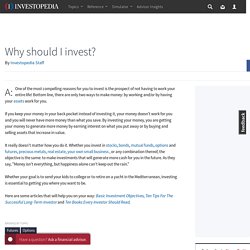
Bottom line, there are only two ways to make money: by working and/or by having your assets work for you. If you keep your money in your back pocket instead of investing it, your money doesn't work for you and you will never have more money than what you save. By investing your money, you are getting your money to generate more money by earning interest on what you put away or by buying and selling assets that increase in value. It really doesn't matter how you do it.
Whether you invest in stocks, bonds, mutual funds, options and futures, precious metals, real estate, your own small business , or any combination thereof, the objective is the same: to make investments that will generate more cash for you in the future. Five Minute Investing: Introduction. If you are like most persons these days, no one needs to remind you that we live in a hectic society which stretches nearly everyone's schedule to the breaking point.
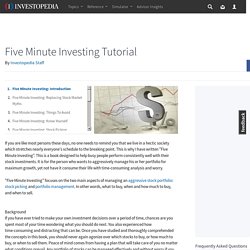
This is why I have written "Five Minute Investing". This is a book designed to help busy people perform consistently well with their stock investments. It is for the person who wants to aggressively manage his or her portfolio for maximum growth, yet not have it consume their life with time-consuming analysis and worry. "Five Minute Investing" focuses on the two main aspects of managing an aggressive stock portfolio: stock picking and portfolio management.
Investing 101: Types Of Investments. We've already mentioned that there are many ways to invest your money.
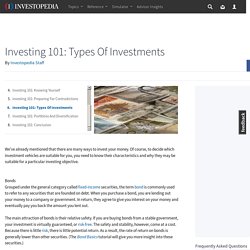
Of course, to decide which investment vehicles are suitable for you, you need to know their characteristics and why they may be suitable for a particular investing objective. Bonds Grouped under the general category called fixed-income securities, the term bond is commonly used to refer to any securities that are founded on debt. When you purchase a bond, you are lending out your money to a company or government. In return, they agree to give you interest on your money and eventually pay you back the amount you lent out. The main attraction of bonds is their relative safety. Portfolio Basics For The Beginner Investor.
Arguably the hardest step in investing is the first step.
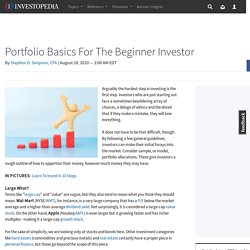
Investors who are just starting out face a sometimes bewildering array of choices, a deluge of advice and the dread that if they make a mistake, they will lose everything. It does not have to be that difficult, though. By following a few general guidelines, investors can make their initial forays into the market. Consider sample, or model, portfolio allocations. These give investors a rough outline of how to apportion their money, however much money they may have. Getting Started In Stocks. So you've decided to invest in the stock market.
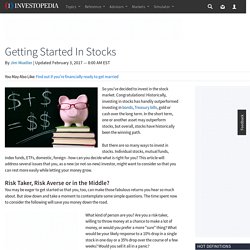
Congratulations! Historically, investing in stocks has handily outperformed investing in bonds, Treasury bills, gold or cash over the long term. In the short term, one or another asset may outperform stocks, but overall, stocks have historically been the winning path. But there are so many ways to invest in stocks. Individual stocks, mutual funds, index funds, ETFs, domestic, foreign - how can you decide what is right for you? Introduction To Bonds - Complete Guide To Corporate Finance. Companies may issue bonds to finance operations.
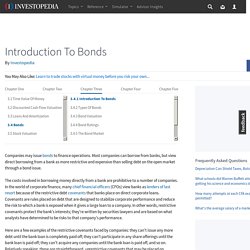
Most companies can borrow from banks, but view direct borrowing from a bank as more restrictive and expensive than selling debt on the open market through a bond issue. The costs involved in borrowing money directly from a bank are prohibitive to a number of companies. In the world of corporate finance, many chief financial officers (CFOs) view banks as lenders of last resort because of the restrictive debt covenants that banks place on direct corporate loans. Covenants are rules placed on debt that are designed to stabilize corporate performance and reduce the risk to which a bank is exposed when it gives a large loan to a company.
In other words, restrictive covenants protect the bank's interests; they're written by securities lawyers and are based on what analysts have determined to be risks to that company's performance. Of course, you're not going to loan your money for free. Three Main Uses1. Types Of Bonds. Forex Tutorial: What is Forex Trading? What Is Forex?
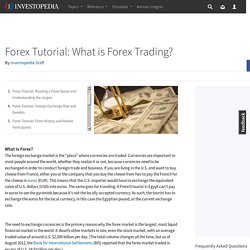
The foreign exchange market is the "place" where currencies are traded. Currencies are important to most people around the world, whether they realize it or not, because currencies need to be exchanged in order to conduct foreign trade and business. If you are living in the and want to buy cheese from , either you or the company that you buy the cheese from has to pay the French for the cheese in euros (EUR). This means that the importer would have to exchange the equivalent value of U.S. dollars (USD) into euros. The same goes for traveling. Day Trading for Beginners. Day trading – the act of buying and selling a financial instrument within the same day, or even multiple times over the course of a day – can be a lucrative game.
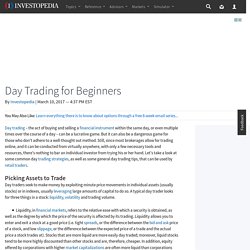
But it can also be a dangerous game for those who don't adhere to a well-thought out method. Still, since most brokerages allow for trading online, and it can be conducted from virtually anywhere, with only a few necessary tools and resources, there's nothing to bar an individual investor from trying his or her hand. Let's take a look at some common day trading strategies, as well as some general day trading tips, that can be used by retail traders. Beginner's Guide to Trading Fixed Income: Introduction. This Beginner's Guide to Trading Fixed Income will examine the basic structure of the fixed-income market, explain some of the differences between trading fixed income and trading equities, and look at some of the advantages and disadvantages of trading fixed income.
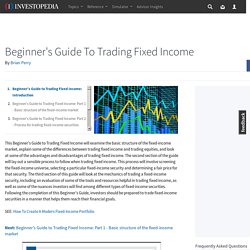
The second section of the guide will lay out a sensible process to follow when trading fixed income. This process will involve screening the fixed-income universe, selecting a particular fixed-income security and determining a fair price for that security. The third section of this guide will look at the mechanics of trading a fixed-income security, including an evaluation of some of the tools and resources helpful in trading fixed income, as well as some of the nuances investors will find among different types of fixed-income securities.
Beginner Trading Fundamentals: Limiting Risk. In the context of trading, "risk" refers to the probability of losing money or trading capital.
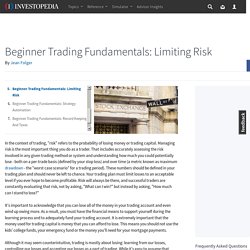
Managing risk is the most important thing you do as a trader. That includes accurately assessing the risk involved in any given trading method or system and understanding how much you could potentially lose - both on a per-trade basis (defined by your stop loss) and over time (a metric known as maximum drawdown - the "worst case scenario" for a trading period). These numbers should be defined in your trading plan and should never be left to chance. Your trading plan must limit losses to an acceptable level if you ever hope to become profitable. Risk will always be there, and successful traders are constantly evaluating that risk, not by asking, "What can I win? " What's interesting to note is that our 1:1 strategy does not make money until we are 60% profitable; that is, until we win six out of the 10 trades.
How To Start Trading: Introduction. Trading is an active style of participating in the financial markets that seeks to outperform traditional buy-and-hold investing. Rather than trying to profit from long-term uptrends in the markets, traders look for short-term price moves to profit in both rising and falling markets. Beginner Trading Fundamentals: Introduction. Trading is an active style of participating in the financial markets, which seeks to outperform traditional buy-and-hold investing. Instead of waiting to profit from long-term uptrends in the markets, traders seek short-term price moves in order to profit during both rising and falling markets.
As a trader, you can be your own boss, work from home, set your own schedule and have the opportunity to achieve unlimited income potential. These factors, combined with the ease with which someone can enter the field, help make trading attractive. While it's relatively easy to start trading - after all, you don't need any advanced degrees or specialized training - it is very difficult to become good at it and to become successful.
Bond Basics: Introduction. The first thing that comes to most people's minds when they think of investing is the stock market. After all, stocks are exciting. The swings in the market are scrutinized in the newspapers and even covered by local evening newscasts. Stories of investors gaining great wealth in the stock market are common. Bonds, on the other hand, don't have the same sex appeal. The lingo seems arcane and confusing to the average person. However, all it takes is a bear market to remind investors of the virtues of a bond's safety and stability. This tutorial will hopefully help you determine whether or not bonds are right for you. (Before proceeding, it would be helpful for you to know a little about stocks.
Stocks Basics: Introduction. Turn on the TV news or open a newspaper, surf the internet or listen to the radio, and you will probably come across some information about the stock market: “The Dow Jones closed at record highs”; “The S&P 500 is trading down two-tenths of one percent”; “The stock market is reacting to news from Washington.” The stock market seems to be everywhere in our daily lives, but what exactly is the stock market?
And, what are stocks that are bought and sold on this market?